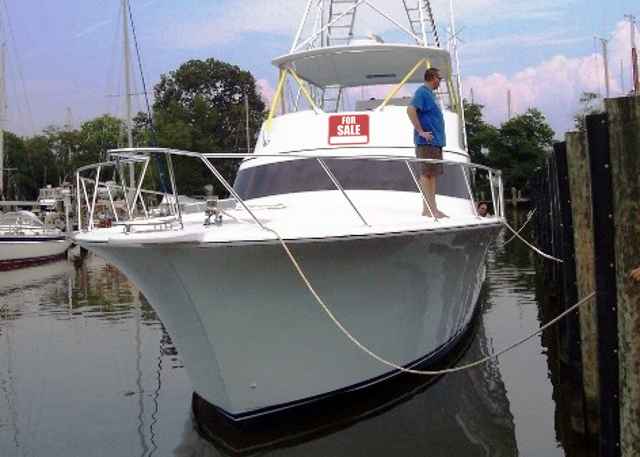Although many of us dream of the day we can quit our jobs and go cruising, the balance in our retirement account may not allow for that just yet. For that reason, many people who love boats and know more than their fair share about them often entertain the idea of working in the marine business. Becoming a yacht broker is one prospect many find intriguing; here are some of the basic requirements.
Above: A female yacht broker responding to customer leads overlooking a harbor at a marina office. Photo via Pond5.
How Do I Become A Successful Yacht Broker?
Brokers who specialize in selling yachts should know trends in the yacht industry, be familiar with the various types of boats on the market, and understand how certain brands compare to others in terms of quality, construction, performance and price. Successful brokers say you should know boats and yachts like the back of your hand. You have to be able to discuss boats in detail, because your customers will certainly be able to do so.
A broker may also need to be familiar with maritime law and the environmental regulations pertaining to the areas where his or her customers will dock their new rides. After all, you can’t sell someone a boat that’s not allowed in a close marina where waste water treating capabilities are not up to snuff. Just as critical, brokers require knowledge about the legalities of buying, selling and owning yachts, including state and federal laws.

Education
The Bureau of Labor Statistics says brokers usually require a bachelor’s degree to find employment, although some get by without formal degrees. A high school diploma with some retail sales experience could suffice, particularly if coupled with classes in retail marketing and sales. Computer skills and a familiarity with internet marketing are also strong skills to have in today’s market. Certification isn’t mandatory, but the Yacht Brokers Association of America (YBAA) recommends that sales reps get certified.
Licenses
Not all states require yacht brokers to obtain licenses, but the states that do may also ask for proof of sales experience, specifically while working under a licensed broker. Some states also require background checks. As part of the licensing process, yacht brokers may have to take out surety bonds to protect themselves and their clients financially. Once you’ve obtained your license, you’ll still have to be willing to write more checks in the future; licenses have to be renewed according to state guidelines.
Yacht Broker Certification

Above: It’s strongly recommended to get your CPYB certification as a professional yacht broker in the industry in order to build trust and reputation in the market and become successful selling yachts. Image via SuperYachtsMonaco.
YBAA, one of the key professional organizations in this field, strongly recommends CPYB certification, which stands for Certified Professional Yacht Broker. And chances are good that prospective buyers will feel more comfortable working with someone who holds this certification. Eligibility requirements include at least three years’ experience in sales and yacht brokerage, proof of appropriate trust or escrow accounts, a history of using legal sales contracts, and possession of all necessary licenses. If you meet those requirements, you take a certification exam, which includes questions about broker transaction processes, legal reports, ethics, and sales regulations.
How Much Do Superyacht Brokers Make?
The amount of money a yacht broker makes each year can vary greatly, and depends of course on the number of yachts they are able to sell and the price of those boats. The yacht brokerage process typically begins when a boat seller lists the yacht with a broker. Generally, the seller will agree to pay a commission to the yacht broker when the vessel sells (usually 10 percent of the boat’s purchase price). This commission will be paid to the selling broker at the closing. So even at this early stage the seller has professional representation in the transaction.
Salaries for a yacht broker can range in the U.S. from 80,000 to over a million dollars annually, with an estimated average of $105,000 per year.
Yacht Broker Contact Lists
To be a successful yacht broker, get to know people who own boats or may want to in the future. Join boating clubs, yacht clubs, or other organizations that count among their members people who can afford a luxury purchase. Veteran brokers also stress the importance of patience and persistence, and of developing long-term relationships, since a boat is rarely an impulse buy.
The sale of a yacht can take time, but the return on investment can only fortify that retirement account—putting you on the road to your own cruising a little bit sooner.
For more information on yacht sales and brokering, read:
How to Sell a Yacht: Expert Advice From a Superyacht Broker
Yacht Broker vs. Boat Dealer: What is the Difference?
Buying from a Yacht Broker: Commissions, Escrow Accounts, Taxes, and More

